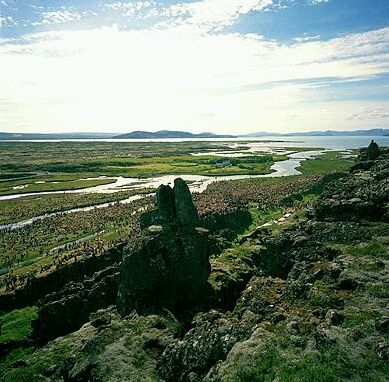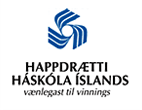Question
How did the ancient Alþingi (parliament) function, and what was its significance for the Icelandic nation?
Asked By
Arnór Hauksson
Answer
Space does not permit of a detailed description here of how the Alþingi functioned. Briefly, the assembly may be said to have functioned in two ways at different periods of the time that the Alþingi was held at Þingvellir.- During the earlier period, from the first half of the 10th century to the latter half of the 13th, it was the national assembly of the Old Icelandic Commonwealth, and its legislative body. Little is known of its functions in the earliest years, but during the period for which we have reasonably reliable sources, the Alþingi comprised seven different bodies. The Lögrétta (Law Council) was primarily a legislative body. Four Quarter Courts judged legal cases from each of the four Quarters of the country. The Fifth Court dealt with cases which could not be resolved in the relevant Quarter Court, as well as various cases arising from legal procedures at the assembly. Finally Lögberg (the Law Rock) was the official place for public announcements.
- During the later period, from the latter half of the 13th century when the Icelanders submitted to foreign rule, until about 1800, the Law Council was in general the only institution of the Alþingi which functioned regularly. It functioned primarily as a court of law, but it often expressed opinions on legislative matters, especially before royal authority became absolute by law in the latter half of the 17th century. In the later half of the 16th century a special Upper Court was founded at the Alþingi.

- Björn Þorsteinsson: Íslenzka þjóðveldið. Reykjavík, Heimskringla, 1953.
- Einar Arnórsson: Réttarsaga Alþingis. Reykjavík, Alþingissögunefnd, 1945 (Saga Alþingis I).
- Grágás. Lagasafn íslenska þjóðveldisins. Reykjavík, Mál og menning, 1992.
- Gunnar Karlsson: Iceland's 1100 Years. The History of a Marginal Society. London, Hurst, 2000.
- - - "Upphaf þjóðar á Íslandi." Saga og kirkja. Afmælisrit Magnúsar Más Lárussonar (Reykjavík, Sögufélag, 1988), 21-32.
- Saga Íslands I-VI. Samin að tilhlutan Þjóðhátíðarnefndar 1974. Ritstjóri Sigurður Líndal. Reykjavík, Hið íslenska bókmenntafélag, 1974-2003.
Um þessa spurningu
Dagsetning
Published 5.3.2005
Category:
Keywords
Citation
Gunnar Karlsson. „How did the ancient Alþingi (parliament) function, and what was its significance for the Icelandic nation?“. The Icelandic Web of Science 5.3.2005. http://why.is/svar.php?id=4787. (Skoðað 1.2.2026).
Author
Gunnar Karlssonprófessor emeritus í sagnfræði við HÍ



